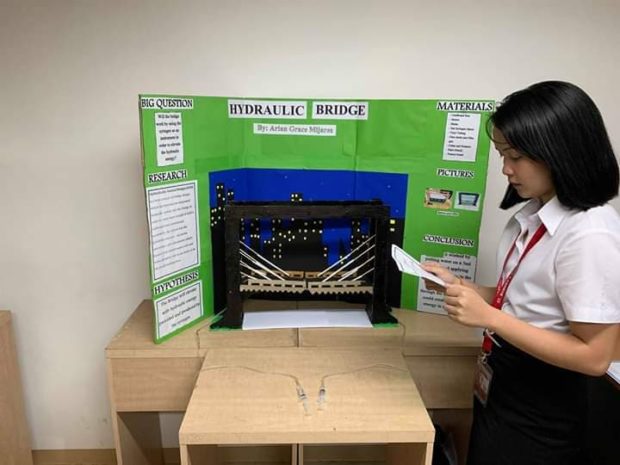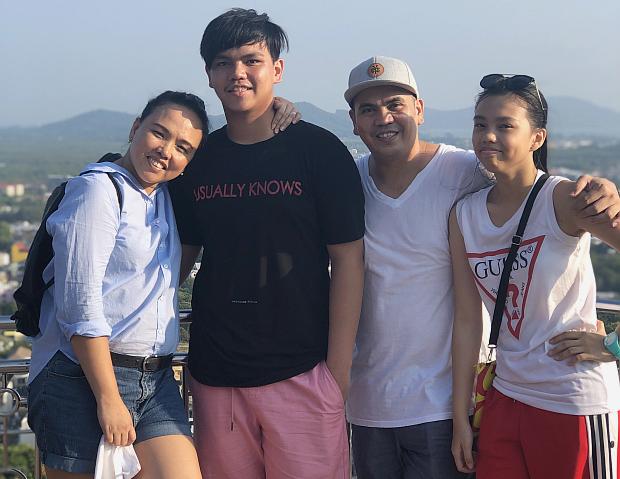Filipino students in Thailand choose transnational education

Incoming Grade 11 student Arian Mijares in a face-to-face classroom setting in SRIA Bangkok. (Photo by EUNICE BARBARA NOVIO / INQUIRER.net)
BANGKOK, Thailand — “I’m very excited to attend my classes in June,” says Arian Mijares, a 17-year-old incoming Grade 11 student.
But unlike the over 23 million Filipino students from kindergarten to high school, Arian will not have to brave the traffic or the inclement weather in the Philippines.
That’s because Arian lives in Thailand but studying in a Philippine school.
Jarvey and Iran dela Paz, choreographers in Phuket also opted to enroll their two kids, Jarmaine and Ciara, in a transnational education school. The two are incoming Grade 7 and Grade 4 students, respectively.
“Our children had on and off education,” Dela Paz explains. “Due to the nature of our work, we cannot monitor them, so we sent them back to the Philippines. Aside from that, we cannot afford the tuition fees in international schools in Phuket.”
Later, the Dela Paz couple decided to bring the kids back to Thailand, where they could complete their schooling online.
“No matter how financially difficult it was, a family must remain together,” Jarvey says.
Arian and the Dela Paz kids are just among the hundreds of Filipino children in Thailand. They are benefiting from transnational education.

The Dela Paz family (from left): mother Iran, son Jarmaine, father Jarvey, and daughter Ciara. (Photo by EUNICE BARBARA NOVIO / INQUIRER.net)
But is their education accredited in the Philippines? Will they be qualified to study in any universities?
Transnational education (TNE) is defined as an education delivered in a country in which the awarding academic institution is based in another country. The migrants need not travel abroad to get the quality education that their host countries cannot provide.
‘No children left behind’
To ensure that no child would be left behind, the Education for All (EFA) movement, led by the United Nations Educational Scientific and Cultural Organization (Unesco), was adopted in April 2000 by the Dakar Framework at the World Education Forum in Senegal.
As a signatory to the Convention on the Rights of the Child (CRC) and EFA, the Philippines, through the Department of Education (DepEd), launched the Alternative Delivery Modes (ADM) in 2005.
The first ones to be put in place are the MISOSA (Modified In-School, Off -School Approach) and e-IMPACT (Enhanced Instructional Management by Parents, Community and Teachers for the elementary levels.
The Open High School Program (OHSP) at the secondary level was developed in 1988 and later integrated into ADM.
“When parents migrate, the children have to be with them. Oftentimes, it would lead to an interruption or gap in their schooling. ADM ensures that no Filipino child is left behind in terms of Philippine education,” says Dr. Robert Galindez, the CEO of St. Robert’s Group of Companies.
With the rise of the Filipino population in member countries of the Association of Southeast Asian Nations, particularly in Thailand, online education has become a popular mode of learning among children of the overseas Filipino workers (OFW).
At present, there are around 17,000 Filipinos, including their dependents, in Thailand. However, there is no exact number of school-age children. The majority of the OFW children have Non-O visas (for dependents) until they reach the age of 18.
“Arian holds a Non-O visa. When she reaches 18, she will apply for a student visa,” says her mom, Brenda Mijares. Brenda is a teacher in Chachoengsao Province in Central Thailand.
Online learning versus blended
In 2015, Saint Robert’s International Academy (SRIA) — which has its main campus in Iloilo City — started its operation in Bangkok, Thailand. It was one of the first four educational institutions accredited by the DepEd to hold online and blended classes in 2015.
In 2017, SRIA was accredited to offer the K-to-12 program of the DepEd under the OHS.
SRIA boasts of a specialized curriculum to ensure maximum learning experiences specially designed as life skills. This is the Creative Arts Elementary Curriculum for the primary school program. It contains the basic prescribed subjects and is enriched with creative arts courses to stimulate creativity and generate new ideas from the students.
The Special Business High School Curriculum for the secondary school program includes classes on business management, accounting, and information technology.
In 2018, SRIA was also accredited to offer MISOSA and to set up a farm business school. In Thailand, it only offers MISOSA and OHS.
Modemocelle Bitas, SRIA coordinator in Bangkok, explains that under MISOSA the students are divided into groups — the blended learning or the in-school group and the purely online or the off-school group.
The off-school group students are given flexible time. They do their activities independently. But they are also given the option to visit the in-school group.
“Blended learning is 50 percent online and 50 percent face-to-face. At SRIA, the classes are held every Friday and Saturday for blended while online students can choose whether to attend a face-to-face or not. We also do video calls to those who cannot attend the physical class,” explains Bitas.
Arian travels two hours from Chachoengsao to Bangkok to attend her class on Fridays and Saturdays. For the rest of the week, she does all her activities— including quizzes and projects — online.
Transnational education providers follow an academic year of 203 school days.
In Thailand, SRIA observes both Thai and Philippine holidays, conducting make-up classes whenever needed. It also stages a Christmas Party, celebrates Philippines Independence Day and other extra-curricular activities that are important in improving life skills.
“Through online learning, my kids are able to pursue their other interests like music. We are also on hand in monitoring their learning activities. They can do their activities even when we are abroad,” Jarvey says.
Do the parents answer their kids’ homework and online tests?
“No. We instill in them the value of honesty. We are also fulfilled to know that our children are capable of learning in another environment,” says the Dela Paz couple.
Arian cannot contain her excitement. On June 14, she will meet her new classmates comes June 14, unlike when she was in Grade 9.
“There were around four or six students before. But now I hope to see new faces,” Arian beams.
(Editor: Alexander T. Magno)